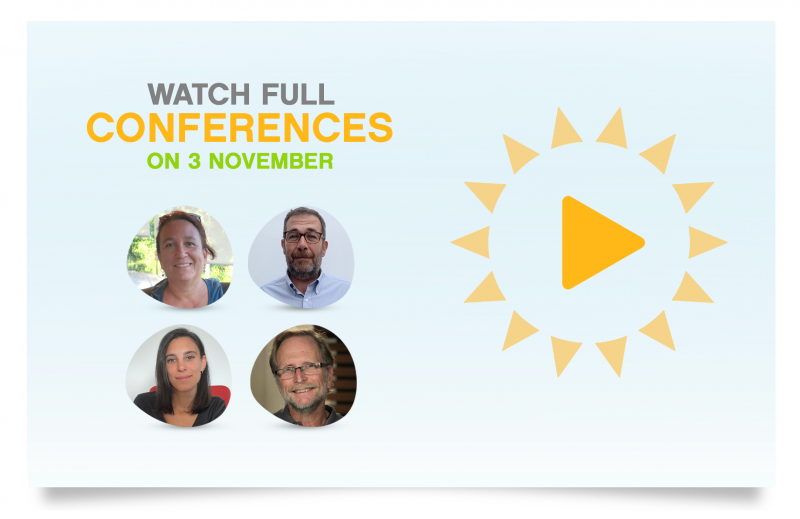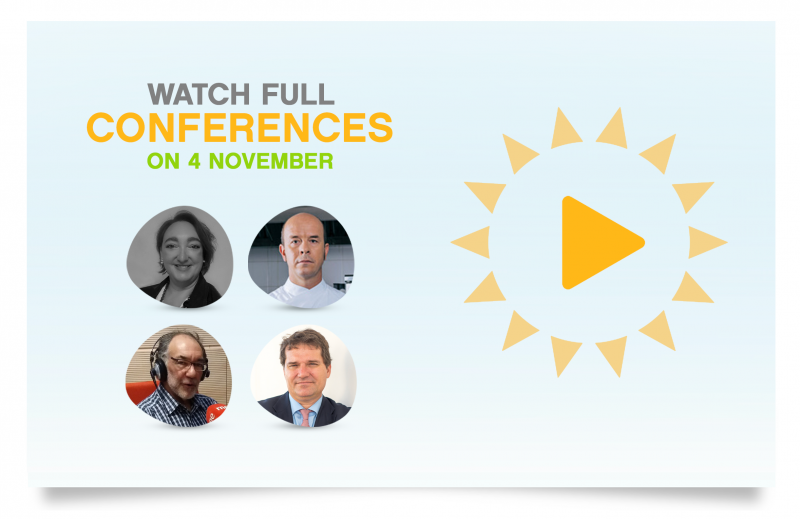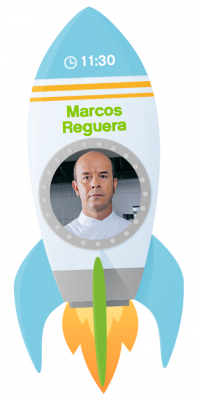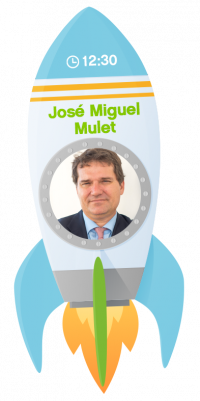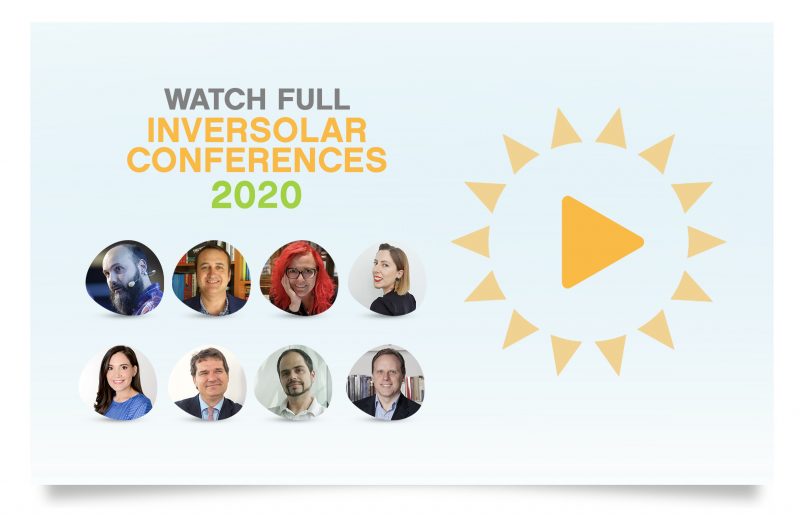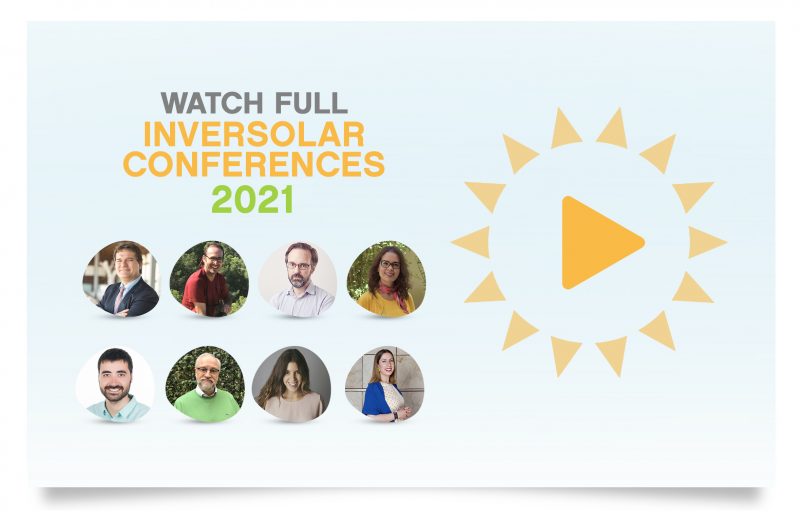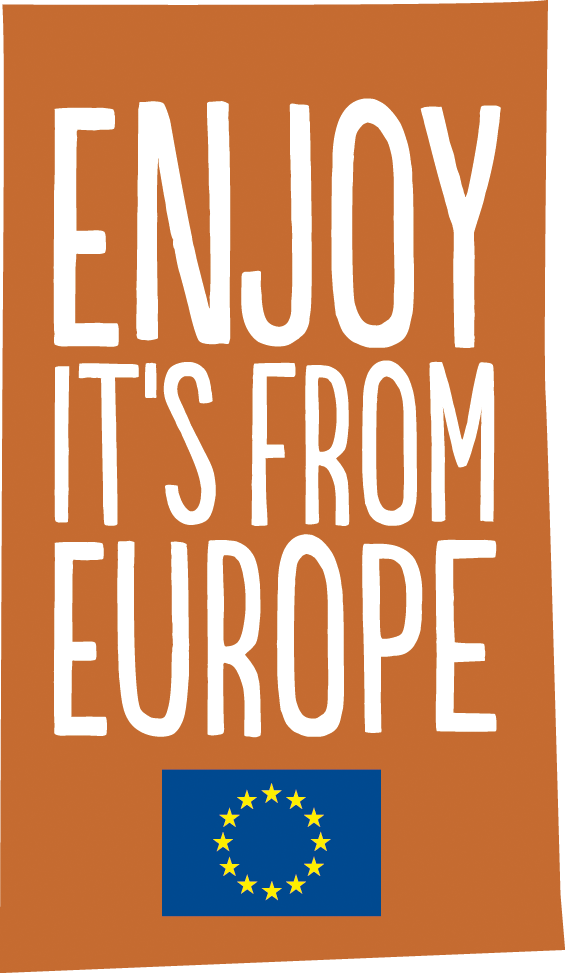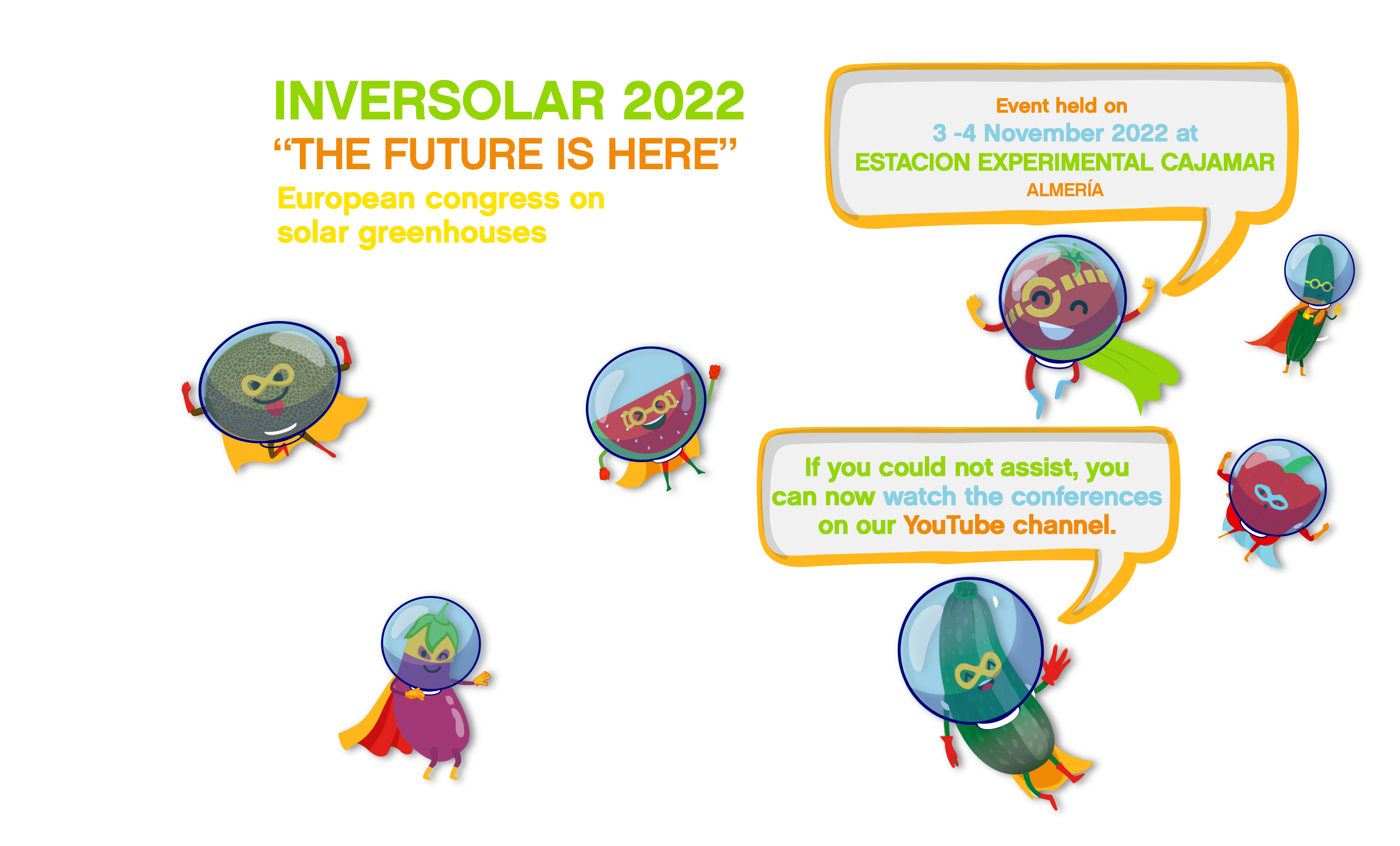

Oftentimes, in most recent futuristic sci-fi works, greenhouses appear as a means of food production. Many authors have noticed the importance of crops grown under plastic in an ever-changing and unpredictable world. For years now, in Almería and Granada, those are a reality that moves forward with a firm step towards the future. At Inversolar 2022, the European congress on solar greenhouses, many scientists and specialists will gather under the slogan “The future is here” in order to make a prediction of tomorrow’s agriculture by analysing today’s facts.
3 NOVEMBER
4 NOVEMBER
SPEAKERS
3 NOVEMBER
Reception of attendees at 10:15 p.m
Official welcome at 10:45 p.m.
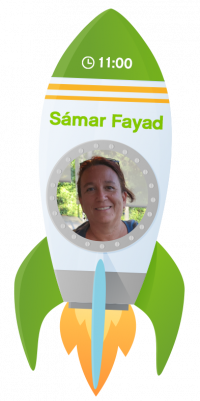
Water Mining. Solar desalination for agricultural use and circular economy.
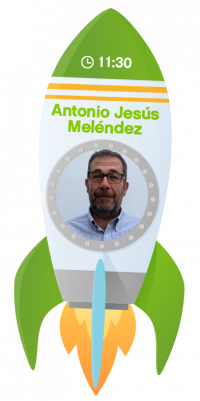
Solar greenhouses: a factory of carotenoids to feed the world in a sustainable and healthy way.
4 NOVEMBER
Official Closing Ceremony 1 p.m.
Gastronomic experience with greenhouse products 1:15 p.m.
Samar Fayad
Water Mining. Solar desalination for agricultural use and circular economy.
BIOGRAPHY
Sámar holds a Degree in Marine Science and has over 20 years of experience in quality control of inland waters. Having broad experience in control and environmental supervision of projects, she is also expert in environmental impact statements and environmental restoration. Currently, she works at the visitors’ centre of the solar platform in Tabernas.
TALK SUMMARY
In her speech, Samar will talk about circular economy and will explain the Water Mining project, which is specially aimed at producing fertilised irrigation water for greenhouses – a possible solution to the high cost of desalination.
Antonio Jesús Meléndez
Solar greenhouses: a factory of carotenoids to feed the world in a sustainable and healthy way.
BIOGRAPHY
Antonio Jesús is a Graduate and Doctor in Pharmacy from the University of Seville, as well as Professor of Nutrition and Bromatology. He belongs to the research group of Food Colour and Quality and has worked both at the Universities of Liverpool and London (United Kingdom) as well as the University of Tufts (Boston, USA). He works in the sustainable production of healthy food, specialising in carotenoids and its derivatives. Having published over 100 scientific papers, he has led different research projects as well as two international networks on carotenoids and derivatives in Agri Food and Health, in which researches from over 50 countries have taken part.
TALK SUMMARY
Antonio Jesús will shed light on carotenoids, pigments that colour fruits and vegetables and are essential for life on Earth and food production. These are fundamental for photosynthesis and plant propagation, also contributing to their efficiency and resilience in order to feed the planet. Moreover, many studies show that they are beneficial for health. Some carotenoids are vital for combating vitamin A deficiency, one of the main nutritional problems worldwide.
Mar Grande
AI to anticipate the evolution of the agro-food market.
BIOGRAPHY
Mathematician specialised in data science and PhD student in Complex Systems and Data Science at the Technical University of Madrid. In her research, Grande applies automatic learning techniques to understand the evolution of financial markets. Currently, she works as a Data Scientist as AGrowingData, where participates in several projects covering data analysis and artificial intelligence. Among them, we can find crop forecasting and product pricing in the agro-food market.
TALK SUMMARY
Understanding the agro-food market is a key and increasingly important task, specially in the interest of achieving sustainable and more equal food systems. In her talk, we will find out how data analysis and artificial intelligence can help us predict the evolution of the agro-food market, and thus anticipate the price crisis and avoid food waste. Finally, we will analyse how to predict the price of the most widespread fruit and vegetable products in greenhouses.
Gary Stutte
The growth of plants in space facilitates food production on Earth.
BIOGRAPHY
Doctor Stutte is an expert in horticulture, plant physiology and space biology and the principal investigator for several spaceflights experiments designed to grow plants in microgravity. One of them is NASA’s Photosynthesis Experiment Systems Testing and Operations (PESTO) experiment, the first plant science experiment to be conducted aboard the International Space Station once it is delivered by the crew of STS-110. The PESTO experiment will study whether wheat will produce oxygen through photosynthesis and purify water through its transpiration at the same pace as on Earth. The experiment could have a great impact in the future long-term spaceflights plans and will be followed by additional experiments onboard the ISS.
TALK SUMMARY
Gary will talk about how the technologies he is developing to allow human life on the Moon and Mars are being used to improve the quality, productivity and profitability of crops on Earth.
Rosa Porcel
Drought resistance: saving water from the roots
BIOGRAPHY
Rosa Porcel is a biologist, Doctor in Biochemistry and Molecular Biology, Professor of the Biotechnology Department at the School of Agricultural Engineering and Environment and the Master’s Degree in Molecular Biotechnology and Plant Cells. Her research is focused on the improvement of plant tolerance to drought. She is a science communicator part of the Naukas platform team and author of the book ‘That was not in my botany book’, winner of the Prismas Prize, an annual science communication award, for the Best Book in 2021.
TALK SUMMARY
In her speech, Rosa will explain to us how a plant is regulated, her research in drought resistance in melons and how the latest advances in biotechnology could achieve a saving in water consumption, not by improving the irrigation system but focusing on the plant needs.
Marcos Reguera
Aromatic milestones in greenhouse crops
BIOGRAPHY
This chef with 25 years of experience has spent the last years developing new food industrial products, testing and renovating existing products, as well as designing and materialising conceptos and food structures applicable both to industry and the restoration sector in general. Reguera collaborates with companies such as Mare Deus Food Solutions, Sandwich LM, Aceites Castillo de Canena or Mariscos Castellar, apart from Basque Culinary Centre.
TALK SUMMARY
Irish philosopher Berkeley stated that an apple’s flavour is not to be found on the apple nor in whoever tastes it, but in the encounter of both. That encounter, that reflection of one thing above another, is the beauty, the strength of reality. And that is the truth of art.
In order to approach that encounter with greenhouse vegetables, what better way than by knowing their flavour and aromatic structure, as well as focusing our attention on the milestones that consolidate their harmony and some current food trends.
Bernardo Herradón
New materials: the future of vegetable waste management
BIOGRAPHY
Doctor in Chemical Sciences (UCM, 1986). Former Director (2006-2010) and current Research Scientist at the Institute of General Organic Chemistry in the Spanish National Research Council. He has also investigated at the University of Alcalá, ETH-Zürich and Stanford University. His research topics cover a wide range of areas within organic chemistry. Among his goals is the communication of scientific culture, specially among high school students and has thus participated in several activities. He directs the science communication course ‘The advances of chemistry and its impact in society’. He is the Scientific Curator of the ‘Among molecules’ exposition by CSIC and scientific consultant of ‘The image of chemistry, uncover it!’ and ‘Science integration’. Author of the book ‘The advances of chemistry’. In July 2014, he founded the Gnanomat company. He has also been treasurer and president of the Territorial Section of Madrid at the Spanish Royal Society of Chemistry (RSEQ). In 2016, he was awarded with the Plaque of Honour by the Association of Spanish Scientists and the Gold Medal by the Chemistry Association of Madrid.
TALK SUMMARY
Bernardo will focus on the future possibilities of vegetable waste management as a source of new materials through the latest researches and technologies in this domain
Jose Miguel Mulet
Biostimulants: keys for adaptation to change.
BIOGRAPHY
Professor of Biochemistry and Molecular Biology, Professor and Researcher at the Polytechnic University of Valencia, he manages a research line at the Institute of Molecular Biology and Plant Cells (IBMCP), focused on developing plants which tolerate drought and cold. He also manages the Master’s Degree of Molecular Biotechnology and Plant Cells. As a science communicator, he has published the following books: ‘Real ecologism’, ‘Eating without fear’, ‘Medicine without tricks’, ‘What is to eat healthily?’ and ‘What is a healthy life?’, apart from writing several science papers in the digital press and giving lectures at a national and international level.
TALK SUMMARY
Mulet will explain how to adapt crops to global warming while still fulfilling the European norms, which do not approve the use of transgenics and forbids the use of phytosanitary products, by using microorganisms and bio stimulating agents.


